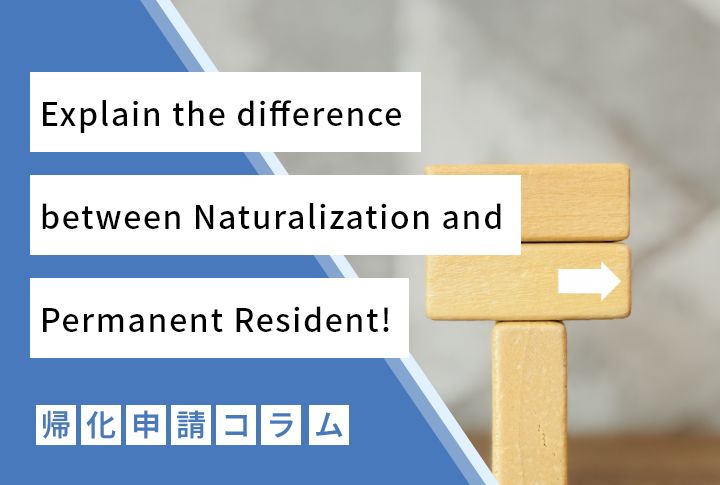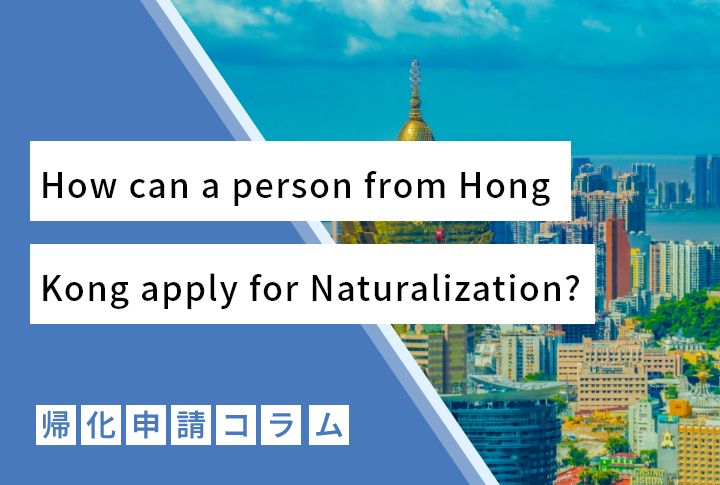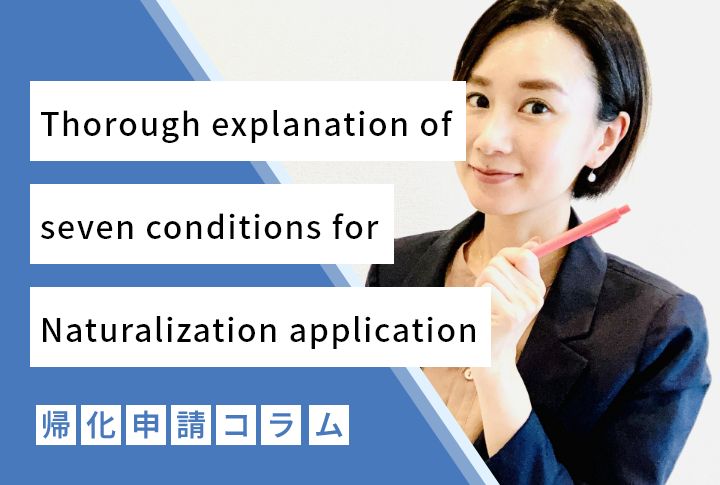Explain the difference between Naturalization and Permanent Resident!

I think that many foreigners living in Japan ultimately hope to obtain Permanent Resident or Naturalization to acquire Japanese nationality.
On this page, we will introduce the differences between Permanent Resident and Naturalization, as well as their advantages and disadvantages.
If you are considering obtaining Permanent Resident or applying for Naturalization, please refer to it.
Index
1. What is a Naturalization application?
A Naturalization application is a procedure for a person with foreign nationality to acquire Japanese nationality.
If you are naturalized, you will be able to create a Japanese family register, acquire the right to vote and vote in elections.
In addition, you will gain rights as a Japanese person, such as being able to continue living in Japan without renewing your visa.
2. What is a Permanent Resident visa?
A Permanent Resident visa is a visa that allows foreigners to stay in Japan without a period of stay.
The major differences from other visas are that (1) there is no fixed period of stay, and (2) there are no restrictions on activities in Japan.
In addition, it is not uncommon for Japanese financial institutions to require that applicants have a Permanent Resident visa when examining home loans, I have the impression that this point is also a major reason for wanting to obtain a Permanent Resident visa.
A Permanent Resident visa is a visa for continuing to live in Japan as a “foreigner”, so it is completely different from Naturalization to become a Japanese citizen.
2-1. Thorough comparison of Naturalization and Permanent Resident visa!
In this chapter, we will explain the difference between Naturalization and Permanent Resident visa.
First, please see the table below.
| Permanent Resident | Naturalization | |
| Change of Nationality | NO change | Become Japanese |
| Where to apply | Immigration Bureau | Legal Affairs Bureau |
| Application agency | Possible | Impossible |
| Required documents | Less than Naturalization application | More than Permanent Resident visa application |
| Examination period | About 4 months | About 1 year |
| Forced deportation | YES | NO |
〇Regarding application agency
Permanent Resident visa applications can be made by appearing at the immigration office of the jurisdiction on behalf of the person in the form of an application agent, such as an administrative scrivener.
However, an application for Naturalization must be made by the applicant himself/herself in person at the Legal Affairs Bureau with jurisdiction, even if the administrative scrivener can prepare the documents, but cannot apply instead.
If the person wishing to be Naturalized is under the age of 15, the person with parental authority or a legal representative will make the application on their behalf.
〇 Required documents
The documents required for both Permanent Resident visa application and Naturalization application will change depending on the applicant’s situation.
However, in general, it can be said that the amount of documents required for a Naturalization application is larger than that for a Permanent Resident visa application, and the difficulty of collecting the required documents is higher.
This is because the application for Naturalization is the work of creating a new “family register” that proves the identity of a Japanese person.
In other words, the “family register” is a record of all the personal matters related to the subject, such as records of Japanese marriages, records of adoption, names of parents, birth records of children, etc.
Since it is necessary to prove the identity matters that should be recorded in the “family register” when applying for Naturalization, there will be a lot of documents.
In addition, it is necessary to obtain documents issued by public institutions in your home country as proof of your identity.
This point is also a factor that makes the Naturalization procedure feel troublesome.
〇 About the examination period
The above period is only a guideline, it is not rare to take 5 to 6 months to process a Permanent Resident visa.
On the other hand, in the case of a Special Permanent Resident’s Naturalization application, it may be permitted in about 6 months from the application.
〇 About forced deportation
Obtaining a Permanent Resident visa does not change the fact that you are a foreigner.
Therefore, for example, if you commit a serious crime and are sentenced to imprisonment, you may be subject to deportation and be forced to leave the country.
On the other hand, the naturalized person will not be ordered to leave Japan because he or she has committed a serious crime after Naturalization.
Next, the table below briefly summarizes the differences in requirements for Naturalization and Permanent Resident visa.
| Naturalization | Permanent Resident | |
| Address requirement principle | Address requirement = 5 years (Employment requirement = 3 years) |
Address requirement = 10 years (Employment requirement = 5 years) |
| Exceptions to address requirements (If you are married to a Japanese) |
Marriage period = 3 years Address requirement = 1 year or Marriage period = None Address requirement = 3 years |
Marriage period = 3 years Address requirement = 1 year |
From this table, you can see that the requirements for Naturalization applications are more relaxed than those for Permanent Resident visa.
In fact, as for the living requirements (annual income requirements), the application for Naturalization is much more relaxed than the application for a Permanent Resident visa, also there are many cases where “Permanent Resident visa is impossible, but Naturalization is possible”.
See below for a detailed explanation of the requirements.
>> Click here for Permanent Resident Visa Requirements
>> Click here for Naturalization application conditions
2-2. Differences between Permanent Resident and Naturalization ~Until obtaining permission~
In this chapter, we will explain the difference between the process of obtaining permission for Permanent Resident and Naturalization.
[For Permanent Resident]
① Preparation of application forms and collection of required documents
▼
② Apply at the immigration Bureau
▼
③ Notification of review completion
The process of obtaining permission for a Permanent Resident visa is almost the same as changing or renewing a visa.
[For Naturalization]
① Prior consultation at the Legal Affairs Bureau (confirmation of required documents)
▼
② Preparation of application forms and collection of required documents
▼
③ Inspection of application documents and acceptance of application at the Legal Affairs Bureau
▼
④ Interview at the Legal Affairs Bureau
▼
⑤ Decision on permission (published in Official Gazette)
Just looking at this, you can see that there are more procedures to apply for Naturalization than to apply for a Permanent Resident visa.
Furthermore, ③ in the first inspection of the application documents, the person in charge of the Legal Affairs Bureau may not necessarily judge that there is no problem and accept the Naturalization application, but in many cases, it is necessary to check the application documents several times.
If the Naturalization application is successfully accepted, an interview will be held about 3 months after the application.
If permission for Naturalization is granted, your name will be published in the Official Gazette (a newspaper published by the Japanese government).
In case of refusal, you will receive a refusal notice.
Please note that they will not be able to tell you the reason for the refusal, so we recommend that you keep a copy of the application documents for later verification.
2-3. Differences between Permanent Resident and Naturalization ~After obtaining permission~
Next we will explain the difference in procedures after obtaining permission for Permanent Resident and Naturalization.
[For Permanent Resident]
① Receipt of a Permanent Resident’s residence card at the Immigration Bureau
This point is the same as changing or renewing a visa.
[For Naturalization]
① Receipt of Naturalization permission notice and Identification card at the Legal Affairs Bureau
▼
② Return of residence card and Special Permanent Resident certificate
▼
③ Notification of Naturalization at the municipal office of the applicant’s address
If your name is published in the Official Gazette, you will receive a notification of permission from the Legal Affairs Bureau.
You have to go to the Legal Affairs Bureau by the specified date and receive a notice of permission for Naturalization and an Identification card.
Next, it is necessary to return the residence card to the Director-General of the Immigration Services Agency within 14 days from the day on which the name after Naturalization was announced in the Official Gazette.
If you are a Special Permanent Resident, return your Special Permanent Resident certificate to the municipal office.
And the Naturalized person must submit the “Naturalization Notification” and the “Certificate of Identity of the Naturalized Person” to the municipal office of the place of residence or permanent domicile (bringing the seal) within 1 month from the date of publication in the Official Gazette (for compilation of the family register).
2-4. Advantages and disadvantages of Naturalization or Permanent Resident
We have explained the difference between Naturalization and Permanent Resident so far, but there are advantages and disadvantages depends on each person.
Below, we will explain the differences between those who have been Naturalized and those who have obtained a Permanent Resident visa.
① Passport
Even if you obtain Permanent Resident, your nationality will not change, so you will continue to have the same passport as before.
On the other hand, if you Naturalize, you can get a Japanese passport.
Japan has visa exemption agreements with many countries, and you can travel to those countries without a visa.
For those who like to travel abroad, this may be an advantage.
On the other hand, Japan does not recognize dual nationality, so if Naturalization is permitted, in principle you must renounce your home country’s nationality.
In other words, if you Naturalize, it means that the passport you had until then will expire.
Unless your home country and Japan have a visa waiver agreement, you will need to obtain a visa each time you return to visit relatives.
② Suffrage
According to the Constitution of Japan, foreigners are not allowed to vote or be elected in national elections.
Therefore, even if you obtain Permanent Resident, you will not be able to stand as a member of the Diet or vote in Japanese elections.
On the other hand, if you are Naturalized, you will become a Japanese, and you will be able to vote in elections because the rights granted to Japanese people will be recognized equally, it is also possible for a former foreigner who has Naturalized to become a member of the Diet.
③ Re-entry permission
Even if you obtain Permanent Resident, you are legally a foreigner, so you must obtain a re-entry permit (including a special re-entry permit) when re-entering the country from overseas.
If you fail to re-enter Japan by the re-entry deadline, you will lose your Permanent resident status.
On the other hand, if you Naturalize, you will become Japanese, so you can freely return to Japan no matter how long you have lived abroad.
3. Summary of the difference between Naturalization and Permanent Resident
Would you understand the difference between Naturalization and Permanent Resident visa, such as the examination period and requirements?
Both Naturalization and Permanent Resident visa have advantages and disadvantages.
“Should I be Naturalized or get Permanent Resident?”
Isn’t there a lot of people who have such a problem?
Applying for Naturalization and applying for a Permanent Resident visa are important issues that affect your life.
We Daiichi Sogo Office provides consultations on Naturalization applications and Permanent Resident visa applications free of charge.
We also have staffs who can speak English, Chinese, and Vietnamese, so you can consult with us in your native language.
If you have any trouble with Naturalization application or a Permanent Resident visa, please feel free to contact us.























